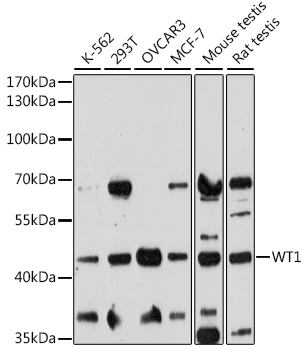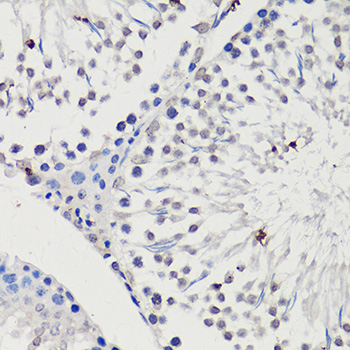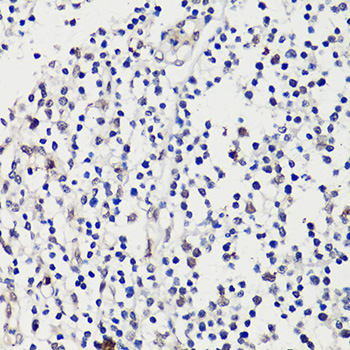-
Product Name
WT1 Polyclonal Antibody
- Documents
-
Description
Polyclonal antibody to WT1
-
Tested applications
WB, IHC, IF
-
Species reactivity
Human, Mouse, Rat
-
Alternative names
WT1 antibody; AWT1 antibody; EWS-WT1 antibody; GUD antibody; NPHS4 antibody; WAGR antibody; WIT-2 antibody; WT33 antibody; Wilms tumor 1 antibody
-
Isotype
Rabbit IgG
-
Preparation
Antigen: Recombinant protein of human WT1
-
Clonality
Polyclonal
-
Formulation
PBS with 0.02% sodium azide, 50% glycerol, pH7.3.
-
Storage instructions
Store at -20℃. Avoid freeze / thaw cycles.
-
Applications
WB 1:500 - 1:2000
IHC 1:50 - 1:200
IF 1:50 - 1:200 -
Validations

Western blot - WT1 Polyclonal Antibody
Western blot analysis of extracts of various cell lines, using WT1 antibody at 1:1000 dilution.Secondary antibody: HRP Goat Anti-Rabbit IgG (H+L) at 1:10000 dilution.Lysates/proteins: 25ug per lane.Blocking buffer: 3% nonfat dry milk in TBST.Detection: ECL Basic Kit .Exposure time: 3min.

Immunohistochemistry - WT1 Polyclonal Antibody
Immunohistochemistry of paraffin-embedded rat testis using WT1 antibody at dilution of 1:100 (40x lens).

Immunohistochemistry - WT1 Polyclonal Antibody
Immunohistochemistry of paraffin-embedded human tonsil using WT1 antibody at dilution of 1:100 (40x lens).
-
Background
Transcription factor that plays an important role in cellular development and cell survival. Recognizes and binds to the DNA sequence 5'-GCG(T/G)GGGCG-3'. Regulates the expression of numerous target genes, including EPO. Plays an essential role for development of the urogenital system. It has a tumor suppressor as well as an oncogenic role in tumor formation. Function may be isoform-specific: isoforms lacking the KTS motif may act as transcription factors. Isoforms containing the KTS motif may bind mRNA and play a role in mRNA metabolism or splicing. Isoform 1 has lower affinity for DNA, and can bind RNA.
Related Products / Services
Please note: All products are "FOR RESEARCH USE ONLY AND ARE NOT INTENDED FOR DIAGNOSTIC OR THERAPEUTIC USE"
